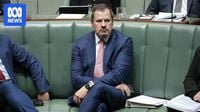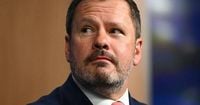Ed Husic, the former industry minister who was recently ousted from the Labor frontbench, has publicly attributed part of his demotion to his outspoken stance on the Gaza conflict. Speaking during an episode of ABC's Insiders, Husic expressed his belief that his advocacy for Palestinian rights and the plight of civilians in Gaza played a significant role in his removal from cabinet. "You can’t celebrate diversity and expect it to sit in a corner silent," he stated, emphasizing the importance of voicing concerns for communities he represents.
Husic’s comments come amid a broader reshuffling of the Labor Party’s leadership, which has seen him and fellow minister Mark Dreyfus removed from their positions in a move many have described as a factional power play. Husic, who made history as the first Muslim cabinet minister in Australia, expressed disappointment in the internal dynamics at play, particularly criticizing Deputy Prime Minister Richard Marles, whom he labeled a "factional assassin" for his role in orchestrating the changes.
In his remarks, Husic noted, "When people look at a deputy prime minister, they expect to see a statesman, not a factional assassin." He accused Marles of prioritizing factional ambitions over the collective good of the Labor Party, suggesting that the recent cabinet reshuffle compromised the party's image following a significant electoral victory. Husic's removal, along with Dreyfus, was reportedly a strategic decision to balance representation between the New South Wales and Victorian factions, with new spots being filled by MPs Sam Rae and Daniel Mulino.
The political landscape within the Labor Party has been tense, particularly regarding the party's response to the ongoing conflict in Gaza. Husic has been one of the most vocal proponents of addressing the humanitarian crisis there, asserting that the Israeli government's actions amount to ethnic cleansing. He stated, "We’ve seen just in the past week or so, the Israeli parliament say it wants to annex Gaza and effectively that is a form of ethnic cleansing. Starvation is a war crime." His comments reflect a growing concern among Australian Muslim communities, who feel their voices have not been adequately represented by the government.
Meanwhile, in the Liberal Party, Senator Jacinta Nampijinpa Price has confirmed her candidacy for deputy leader under Angus Taylor, following her recent defection from the Nationals. Price's shift to the Liberal Party has been marked by her call for the party to return to its core values and to advocate for the "forgotten people" of Australia. "There is no question that returning to our roots as a party is critical right now," she stated, emphasizing the need for the Liberals to reconnect with mainstream Australians.
As both parties navigate their internal dynamics, the upcoming leadership contest within the Liberal Party is expected to be closely contested. Senator Dave Sharma remarked on the importance of unity, stating, "Whatever the outcome is, everyone respects the result and everyone gets behind the new leader." The Liberal Party is set to vote for its leadership team on May 13, 2025, coinciding with the swearing-in of the new Albanese ministry.
Prime Minister Anthony Albanese, who is currently finalizing his new cabinet, has faced scrutiny over the factional maneuvering that led to Husic's and Dreyfus's ousting. Despite acknowledging the need for a cabinet refresh, he expressed sympathy for the two ministers, indicating that their removal was not a reflection of their capabilities but rather a necessary adjustment within the party’s structure.
Albanese's cabinet will retain key figures including Richard Marles, Penny Wong, Jim Chalmers, Katy Gallagher, and Don Farrell, while new appointments are expected to include Youth Minister Anne Aly and Senator Tim Ayres, a left faction powerbroker. The reshuffle comes as Labor seeks to consolidate its position following a resounding electoral victory, with expectations to secure 94 to 96 seats in the 150-seat parliament.
The political turbulence surrounding Husic's removal highlights deeper divisions within the Labor Party, particularly regarding its stance on international issues such as the Gaza conflict. Husic's advocacy for Palestinian rights has resonated with many constituents, and his removal raises questions about the party's commitment to inclusivity and representation.
As the reshuffling of both parties unfolds, the implications of these changes will be closely watched by political analysts and constituents alike. The Labor Party must address the concerns raised by figures like Husic while the Liberal Party navigates its own leadership challenges and seeks to regain the trust of voters.
In a time of significant political realignment, both parties face the challenge of reconciling factional interests with the need for a unified front as they prepare for the next parliamentary term. The upcoming leadership votes and cabinet appointments will shape the trajectory of both parties as they respond to the evolving political landscape in Australia.





